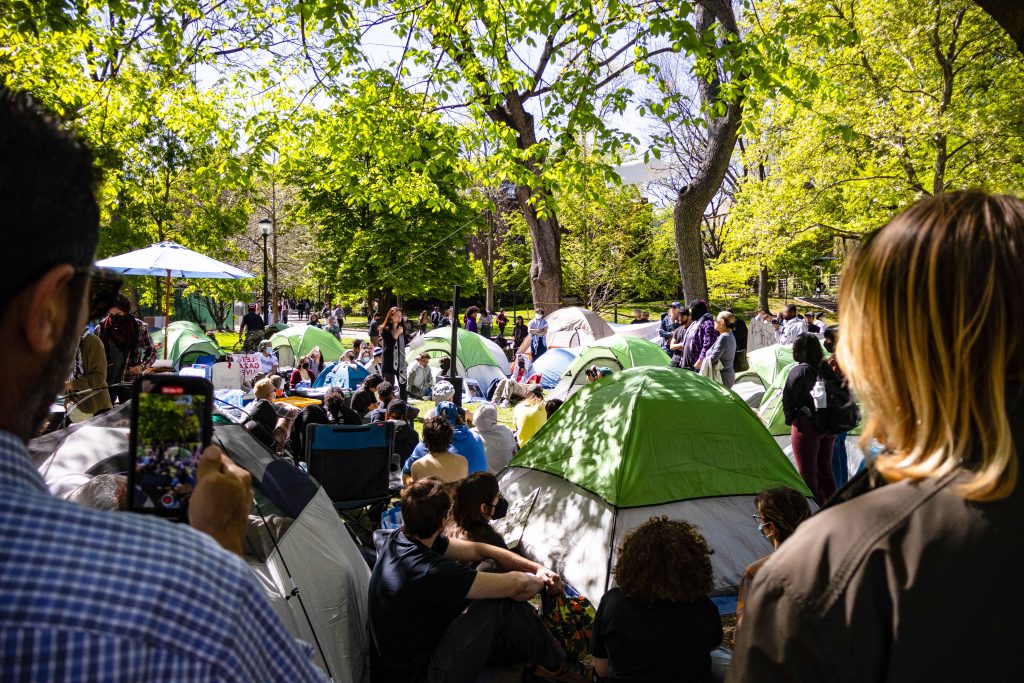
On April 18, 2024 the Spectator, Columbia University’s student newspaper, reported that President Shafik of Columbia had identified a student protest as a “clear and present danger” and called in the New York Police Department to arrest hundreds of students for trespassing on the campus lawn. Those students also received interim suspensions.
You read that right. Columbia students were accused of trespassing on the grass. What was the “clear and present danger?” They were peacefully camping without stopping any campus operations at the time. The encampment was in protest of the war in Gaza and Columbia’s refusal to divest from the war infrastructure. Columbia’s actions set a precedent for other universities like U.T. Austin and Princeton to arrest students for camping despite having allowed other peaceful yet expressive protests in the past.
Regardless of your personal views on the Israel-Palestine war, this is a huge violation of the right to free expression. Although the students were arrested for violating the facially neutral law of trespassing, circumstantial evidence seems to suggest that the students were really arrested for protesting against their university. Students are generally allowed on the lawn, and the only reason Columbia had a problem with people being on the lawn is because the students were protesting. While private organizations technically have the right to decide who to allow on their property, as a university, Columbia should be encouraging the free exchange of ideas which means students should be granted the same level of protections as the Constitution would grant if the students were at a public university. Failure to do so leads to a chilling effect on speech where students become afraid to speak out against important issues in a similar way that selective enforcement of, say, workplace rules against workers attempting to unionize might stifle speech.
It is meaningless to have freedom of speech if it does not protect controversial, unpopular or offensive viewpoints. Radical ideas sometimes propel society forward in ways that we would believe in the present time. There is also educational value in evaluating unpopular ideas and explaining why exactly those ideas are false. Expressing ideas into a void is meaningless, which is why it is important for protests to have a visible presence — like through an encampment — even if the ideas being expressed make some uncomfortable. Of course, this right does not extend to calls for harassment, intimidation, insurrection or the destruction of life or property.
Columbia also violates the due process of students. By issuing interim suspensions, Columbia’s student conduct process presumes the accused to be guilty until proven innocent. The U.S. justice system operates in the reverse, precisely because it is too easy for a government to weaponize its power against those that government officials do not agree with. A murderer in the U.S. justice system has more due process rights than a Columbia student. The consequences of a wrongful suspension are serious. If further investigation determined that a suspension was not warranted, the student would have missed weeks of classes and not had access to campus, putting all academic terms the suspension lasted for in jeopardy. Even if the student were to be reinstated in good standing, the student would be facing accrued student loan interest charges, a record of suspension, and social stigmatization.
The power dynamic between a university and student is also highly asymmetrical which imposes an obligation on the university to look out for the best interests of its students. College is a highly expensive decision that gives students little choice but to finish their degree to pay off their loan. If the university comes up with new rules for students, students have little choice but to follow them because dropping out is seldom a realistic choice. Schools must then not abuse their power to chill speech they do not agree with.
The national wave of arrests should concern all students. While it is currently being applied in the context of the Israel-Palestine war, this gives universities the ability to shut down future protests as well, further threatening the free expression of ideas.
In Philadelphia, students across Philadelphia set up an encampment following the Columbia debacle. Although no arrests have been made at this point, University of Pennsylvania administrators have issued threats to the protesters including suspension. Again, students were threatened with disciplinary procedures for the sole act of protesting.
Drexel’s Student Code of Conduct explicitly prohibits “constructing shelters, camping, or sleeping on Drexel-owned or operated properties…unless otherwise authorized by the Department of Public Safety.” In the most literal interpretation of this clause, the Code would prevent students from falling asleep in class. It can also be applied in an antisemitic way by preventing Jews from celebrating sukkot, a holiday mandating Jewish students to er\ect a temporary outdoor shelter, and in the current context, prevents students from expressing their views or defending free speech at “the most civically engaged university in the United States.”
At this time of heightened unrest, it is important for Drexel and universities nationwide to develop official policies protecting the right to free expression and outlining the specific procedure over when police can be called to intervene in a protest.

